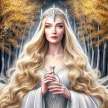
In J.R.R. Tolkien's epic novel The Lord of the Rings, the protagonist Frodo Baggins embarks on a heroic quest that calls into question how much agency he truly has over his own identity and fate. On one hand, his character seems predisposed by forces outside his control - his family lineage, his race as a hobbit, and his mysterious connection to the all-powerful Ring. Yet Frodo's choices, moral fiber, and perseverance in the face of adversity reveal he is not simply a product of destiny, but an autonomous individual who exhibits remarkable courage in shaping his own path.
From the outset, Frodo's identity is tied to his family name and heritage as a Baggins of the Shire. Described as "plain and delectable" hobbits who appreciate the simple pleasures in life, the Baggins clan represents an identity steeped in humility, pastoral pleasures, and aversion to adventure beyond the borders of their insular community.
Frodo himself initially displays these qualities, preferring a quiet life of gardening and drinking ale by the fire. His decision to join the Fellowship seems against his inherent character as a hobbit of the Shire. And yet, as Tolkien writes, "He was acquiring a lasting resilience of spirit and body that few could have expected."
It is the Ring itself, however, that most radically disrupts Frodo's preordained identity and charts the course of his destiny. As the ring-bearer tasked with infiltrating Mordor and destroying the Ring, Frodo finds himself inextricably intertwined with this corrupting talisman of power from the moment it is thrust upon him.
While seemingly chosen at random, or by the machinations of the wizard Gandalf, it gradually becomes evident that Frodo's pure spirit and strength of character uniquely prepare him for such an imposing burden. "I will take the Ring," he utters, "though I do not know the way."
From escaping the Shire to traversing Mordor, Frodo's heroic journey strips away the complacency of his pastoral origins and forges a new tempered identity. Tested by bitter hardship, torture, and the Ring's seductive influence, he must make countless moral choices that define his character.
As we see, Frodo's struggle with his changing personality contrasts with other characters such as Aragorn. Arogorn considers his bloodline to be the rightful heir to the throne of Gondor. Although Frodo is bound to the Ring against his will, Aragorn's royal essence represents his destiny. Gollum, by contrast, is a pitiful figure, completely consumed and deformed by the power of the Ring, while Frodo constantly asserts his autonomous individuality.
As Tolkien himself wrote, "It is not despair, for despair is only for those who see the end beyond all doubt. We do not." I think that this quote encapsulates Frodo's resistance against having his identity determined solely by unseen forces. Even when he surrounded by darkness, we see that he does not surrender hope or his sense of self.
From escaping the Shire to traversing Mordor, Frodo's heroic journey strips away the complacency of his pastoral origins and forges a new tempered identity. Tested by bitter hardship, torture, and the Ring's seductive influence, he must make countless moral choices that define his character.
Though universally tempted by the Ring's ability to subvert his quest, Frodo consistently resists its corrupting power through fortitude, humility, and goodness. His connection to the Ring's dark lineage remains, but he embraces an identity distinct from its malevolent origins.
Conclusion
While factors like ancestry and circumstance foreshadow expectations for Frodo's identity and path, he ultimately transcends these deterministic pressures through personal accountability. His ability to continually answer evil with courage, mercy, and resolve in completing an almost impossible task becomes the true essence of his identity.
About the Creator
Galadriel
Galadriel counseled him that the Three Rings of the Elves should be hidden






Comments
There are no comments for this story
Be the first to respond and start the conversation.